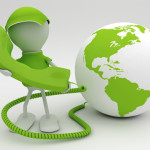Our best friend, our biggest support and our greatest source of knowledge… Our beloved, smartphone.
As much as I hate to admit, I rely HEAVILY on my smartphone… It guides me to friends’ houses, reminds me of appointments, quizzes me before a test, tracks my running mileage, recommends places to eat and even counts my calories (only when I want it to). My smartphone monitors my sleeping habits, knows where my family is, updates me on current events, knows what music I like, helps me shop for groceries and tells me how to dress for the day! I swear, this thing knows me better than some of my friends do!
 Living in the midst of this big data revolution has not only changed the way we conduct business, but it has also “penetrated
Living in the midst of this big data revolution has not only changed the way we conduct business, but it has also “penetrated
every aspect of daily life.” Most of us can agree that our day-to-day activities are now influenced, and oftentimes dominated, by a little handheld device. Stop to think about it. Is there anyone you know who doesn’t own a smartphone..? An article from The Economist explains, “Today about half the adult population owns a smartphone; by 2020, 80% will… The average American is buried in one for over two hours every day. Nearly 80% of smartphone-owners check messages, news or other services within 15 minutes of getting up.”
 Guilty as charged… I am one of those owners who checks my phone within the first fifteen minutes of each new day. Some of you may scoff, but of course I’m going to check my smartphone first thing in the morning! Why look anywhere else when all of the information I need is at my fingertips in a compact, portable, personalized device? I don’t have to pick up a newspaper, go outside to check the weather, or even turn on the television to receive public announcements. Call me lazy or call me efficient, that’s up to you. My phone’s capabilities literally connect me to the world! Those of us who are fortunate enough to have access to such a high-powered device, are going to take advantage of the wealth of knowledge it offers. “The phone takes the processing power of yesterday’s supercomputers—even the most basic model has access to more number-crunching capacity than NASA had when it put men on the Moon in 1969.”
Guilty as charged… I am one of those owners who checks my phone within the first fifteen minutes of each new day. Some of you may scoff, but of course I’m going to check my smartphone first thing in the morning! Why look anywhere else when all of the information I need is at my fingertips in a compact, portable, personalized device? I don’t have to pick up a newspaper, go outside to check the weather, or even turn on the television to receive public announcements. Call me lazy or call me efficient, that’s up to you. My phone’s capabilities literally connect me to the world! Those of us who are fortunate enough to have access to such a high-powered device, are going to take advantage of the wealth of knowledge it offers. “The phone takes the processing power of yesterday’s supercomputers—even the most basic model has access to more number-crunching capacity than NASA had when it put men on the Moon in 1969.”
Remarkably, these resource networks are only getting ‘smarter’ and more affordable. “The cheapest of them now sell for less than $40, and prices are likely to fall even further.” Even the smartphone’s data rate is following this financial trend,” Since 2005 the cost of delivering one megabyte wirelessly has dropped from $8 to a few cents. It is still falling.” While phones and data transmission costs continue to drop, capabilities continue to rise. What does this mean for our future? How are smartphones shaping the world today?
 Amidst today’s rising concern with “technology addiction,” we must be sensitive to the signs and symptoms of this debilitating emotional and social condition. However, I personally agree that the benefits of modern day technological advancements far outweigh the pitfalls. Some argue smartphones impede our ability to communicate, while in reality, they only increase our ability to do so. Their connectivity gives us a voice and a means to communicate with the WORLD. Some negatively suggest smartphones are an escape from life, but aren’t alcohol and substance use the same? Personally, I would much rather have my kid stuck inside a phone reading articles or a console playing games than have him stuck in jail for underage drinking or illicit drug use. Some even go as far to say that owners cannot live without their smartphones. What if those individuals were told to live without the news, access to current events, encyclopedias, reference libraries, radios or weather reports?
Amidst today’s rising concern with “technology addiction,” we must be sensitive to the signs and symptoms of this debilitating emotional and social condition. However, I personally agree that the benefits of modern day technological advancements far outweigh the pitfalls. Some argue smartphones impede our ability to communicate, while in reality, they only increase our ability to do so. Their connectivity gives us a voice and a means to communicate with the WORLD. Some negatively suggest smartphones are an escape from life, but aren’t alcohol and substance use the same? Personally, I would much rather have my kid stuck inside a phone reading articles or a console playing games than have him stuck in jail for underage drinking or illicit drug use. Some even go as far to say that owners cannot live without their smartphones. What if those individuals were told to live without the news, access to current events, encyclopedias, reference libraries, radios or weather reports?
My point: the battle of whether or not the technology is changing our society for the better or for the worse is completely futile. The same human need for connectivity, personal interaction, and access to news or education persists. Smartphones do not make us, as humans, more needy or dependent… they simply change the way our needs manifest.
 The big data revolution and modern-day technological advancements make our possibilities LIMITLESS. Inspiring and innovative developments are in effect, “in developing countries every ten extra mobile phones per 100 people increase the rate of growth of GDP-per-person by more than one percentage point—by, say, drawing people into the banking system. Smartphones will remake entire industries.” While other inspiring and innovative developments are yet to come, “In future, your phone might recommend a career change or book a doctor’s appointment to treat your heart murmur before you know anything is amiss.” When you stop to look at all the infinite opportunities that lie ahead, the smartphone doesn’t seem so bad after all… does it?
The big data revolution and modern-day technological advancements make our possibilities LIMITLESS. Inspiring and innovative developments are in effect, “in developing countries every ten extra mobile phones per 100 people increase the rate of growth of GDP-per-person by more than one percentage point—by, say, drawing people into the banking system. Smartphones will remake entire industries.” While other inspiring and innovative developments are yet to come, “In future, your phone might recommend a career change or book a doctor’s appointment to treat your heart murmur before you know anything is amiss.” When you stop to look at all the infinite opportunities that lie ahead, the smartphone doesn’t seem so bad after all… does it?
-AeroCom Intern






